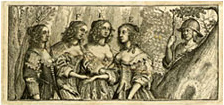Richard Carew, The True and Ready Way to Learn the Latin Tongue (after 1620 - by 1643)
Full Text
Not available
EEBO/TCP
Not available
Date
1620after 1643by
Editor
Book title
The True and Readie Way To Learne the Latine Tongue Attested by Three Excellently Learned and Approved Authours of Three Nations: Viz. Eilhardus Lubinus, a German, Mr. Richard Carew, of Anthony in Cornwall; The French Lord of Montaigne. Presented to the Vnpartiall, both Publick and Private Considerations for those that seek the Advancement of Learning in those Nations
Publication place
London
Printer
R. and W. Leybourn
Publisher
Common-wealth of Learning
Text type
printed book
Genre
Treatises
Subject area
- education
- grammar
- Latin
Summary
Carew argues that the best way to learn a new language is by speaking, reading, and writing it, not by studying its grammatical rules. His father practised this better technique, and he did too, on learning French. Carew explains that in using a language abroad the greatest need was its words for things to which one had to refer.
Extent
45-49
Word-group
type: undifferentiated
Word-entry
type: headword
sample: I finde a great difference in the very naturall framing of the Languages, for in our English tongue a word misplaced alters the sence exceedingly, as every one conceives the difference between a horse-mill and a mill-horse, which is not so in Latine, and the Verb in Latine is seldome joyned with the same word we do in English, and the Adjective commonly followes the Substantive, whereas we commonly put him before the same, and say (a good man) they say (a man good;) and in common talk one word serves instead of a Dictionary to help the understanding of another. (Carew, p. 47)
sample: I finde a great difference in the very naturall framing of the Languages, for in our English tongue a word misplaced alters the sence exceedingly, as every one conceives the difference between a horse-mill and a mill-horse, which is not so in Latine, and the Verb in Latine is seldome joyned with the same word we do in English, and the Adjective commonly followes the Substantive, whereas we commonly put him before the same, and say (a good man) they say (a man good;) and in common talk one word serves instead of a Dictionary to help the understanding of another. (Carew, p. 47)
Alston
XVI.64
Wing
H 1002
Facsimiles
Hartlib, Samuel. The True and Ready Way to Learn the Latin Tongue,
1654
. English linguistics, 1500-1800, no. 280. Menston: Scolar Press, 1971. view record




